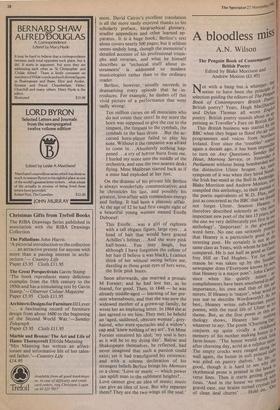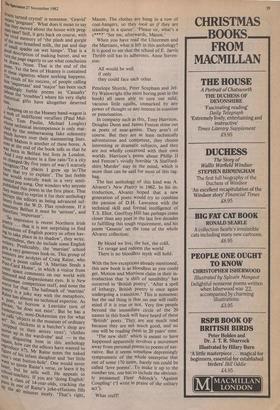A bloodless miss
A.N. Wilson
The Penguin Book of Contemporall British Poetry Edited by Blake Morrison and Andrew Motion (£1.95) Not with a bang but a whimper: seems to have been the principle °. selection guiding the editors of The Penguin ,", Book of Contemporary British Poetri.'d British poetry? Yeats, Hugh MacDiarratih and Dylan Thomas all wrote ErIg`„is poetry. British poetry sounds about as .F; petising as Traveller's Fare on British galh'e This British business was started by BBC when they began to flood the air ern programmes and voices from
Ireland. Ever since the 'troubles'
North again a decade ago, it has been start. eie to turn on Any Questions, Sunday liarn Hour, Morning Service, or Yesterday Parliament without being bombarded witiv the distinctive Ulster brogue. An eal",,h' symptom of it was when they hired 1`10.,r-nre' the Irish bar-maid at the Bull in Antbril-0. Blake. Morrison and Andrew Motion, '4, of compiled this anthology, in their pursuit the poetic equivalents of W.D. Flax', weld just as concerned as the BBC that we shot' is not forget Ulster. Seamus Henne_Y Os( therefore described solemnly as 'the d important new poet of the last 15 Years' arl,,or anthology'. ' the one we very deliberately put first In '0), Important' is the give-aw d word here. No one can seriously Prete,80. impos sib ,f that Heaney is a particularly goOd the teresting poet. He certainly is not In '„0 same class as Yeats, with whom he has b6:,/, °'- compared. He is not half as good as en,' e frey Hill or Ted Hughes. Yet for some reason he was taken up by the Sna:80w newspaper dons CEveryone knows b,,,Y,,0 that at Heaney is a major poet': John La' since when his quietly minor. ,ealf- c. omplishments have been smothered In importance, his own and that of las,i8clo mirers. If Heaney is 'major', what vy°,r,- his you use to describe Wordsworth? P" se. best, Heaney writes sub-Paterian prohis poems, with the rural life of Ulster as ail" theme. But, as the first poem in tillsthing thology shows, Heaney has nn,'"ay' whatever to say. The poem 'Churning ,,d conjures up quite vividly a Childb.00"'"9 memory of his mother making butter 1 lig farm-house. 'The house would stink 1°.0e. after churning day, acrid as a sulphur °lithe The empty crocks were ranged sulphur was piledpagilaeidn,otnhepbauntttreyr sinheslvoefst.printed slabs so So far good, though it is hard to see wilY t‘ in verserhythmical . nes prose T hen it t i s printed starts tious. 'And in the house we moved full gravid ease, our brains turned crystals,ur of clean deal churns' ... Hold on gettingin t he bl7e w
n t brains turned crystal' is nonsense. 'Gravid' means 'pregnant'. What does it mean to say
that they moved about the house with preg- ',ant ease? Still, it gets back on course, with the vivid memory of 'the plash and gurgle of the sour-breathed milk, the pat and slap gc'o of 4411 spades on wet lumps'. That is a d description of making butter, and we heat the page eagerly to see what conclusion ilhPe draws. None. That is the end of the oeto. Yet the best of Heaney is contained I these vignettes where nothing happens. :1e result of his success, of people calling ,,1111 'important' and 'major' has been such appallingly feeble poems as 'Casualty' krahbout the 'trubles') where his very slight et°rieal gifots have altogether deserted a Ping on to the Heaney band-wagon is d- rn°13 of indifferent versifiers (Paul Mul- ,,"?0n, Tom Paulin, Michael LongleY) 'Tose technical incompetence is only mat- bY the embarrassing fake solemnity "Leb hovers over their stammering lines. „ Derek Mahon is another of these bores. A Wte at the end of the book tells us that he born in Belfast but lives in London. rid I step ashore in a fine rain/To a city ;!, changed/By five years of war/I scarcely hif`cognize/The places I grew up in/The es that try to explain'. The last feeble line would scarcely wash in a very senti- rnental Pop song. One wonders why anyone tP,ablished this wan m
ey n the first place. That nted to reprint it for their anthology ",7traYs the editors as being advanced suf-
'erers front the W.D. Flax syndrome. If it ,r11, eations Belfast it must be 'serious', and inerefore 'important'. 0:S0 impressive is recent Northern Irish discussions
• that it is not surprising to find
ins of English poetry so often hav- g to take place in its shadow', they write. w`levertheless, they do inclu de some English aenters. Predictably, the 'martian' school ts a very generous look-in. This group of ,t'uosters are acolytes of Craig Raine, who pwrote a
Poem called 'A Martian Sends a
Z,°st-Card Home', in which a visitor from ter sPace comments on our world with si"used and dispassionate eyes. It is New %,,atesinan competition stuff, and none the p"rse for that. The hallmark of 'martian' ko!trY is a Joky way with the metaphors. a ante has almost no technical expertise. As ok Poet, to borrow a Leavisite turn of !rase, to does not exist'. But he has a h'rnourous, semi-Dickensian eye for what he calls 'objects in the museum of ordinary Sueart' so, chickens in a butcher's shop are PPed to their aertex vests'; 'clothes rn„ue ulp in the wardrobe' and — in the disgusting item in this anthology 'regain, how can the editors have wanted to fipPlirc'dtice it?), Mr Raine notes the naked 41t'erre of his infant daughter and 'her little s neat button-hole'. One would never h..,nt to quote Raine's verse, or learn it by ,_%drt, but he sells well. He appeals to with teachers. If you are 'doing English' n a. class of 14-year-olds crackin the 4,,ns in one of Raine's joke-, effusionsg fills P the 40
minutes nicely. 'That's right,
Mason. The clothes are hung in a row of coat-hangers, so they look as if they are standing in a queue'. 'Please sir, what's a c***?"See me, afterwards, Mason.'
When you have read the Ulstermen and the Martians, what is left in this anthology? It is good to see that the school of E. Jarvis Thribb still has its adherents. Anne Steven- son: All would be well if only they could face each other.
Penelope Shuttle, Peter Scupham and Jef- fry Wainwright (the most boring poet in the book) all seem able to turn out mild, vacuous little squibs, unmarked by any power of thought or any interest in scansion or punctuation.
In company such as this, Tony Harrison, Douglas Dunn and James Fenton shine out as poets of near-genius. They aren't of course. But they are at least technically adventurous and competent, they choose interesting or dramatic subjects, and they are not wholly concerned with their own worlds. Harrison's poem about Philip II and Fenton's vividly horrible 'A Stafford- shire Murder' stay in the mind, which is more than can be said for most of this rag- bag.
The last anthology of this kind was A. Alvarez's New Poetry in 1962. In his in- troduction, Alvarez hoped that a new generation of poets would try to combine the passion of D.H. Lawrence with the technical skill and formal intelligence of T.S. Eliot. Geoffrey Hill has perhaps come closer than any poet in the last few decades to fulfilling this tough requirement, and his poem 'Genesis' set the tone of the whole Alvarez collection:
By blood we live, the hot, the cold, To ravage and redeem the world There is no bloodless myth will hold.
With the few exceptions already mentioned, this new book is as bloodless as you could get. Motion and Morrison claim in their in- troduction that 'a shift of sensibility' has occurred in 'British poetry'. 'After a spell of lethargy, British poetry is once again undergoing a transition.' This is nonsense; but the sad thing is that no one will really mind if it is true or not. Very few people beyond the immediate circle of the 20 names in this book will have heard of these 'British' poets. They are not much read because they are not much good, and no one will be reading them in 20 years' time.
`The new shift' which is meant to have happened apparently involves a movement away from personal poems to poems of nar- rative. But it seems somehow depressingly symptomatic of the whole enterprise that out of some 170 items, barely ten could be called 'love poems'. To make it up to the number ten, one has to include the obvious- ly misnamed Fleur Adcock's 'Against Coupling' ('I write in praise of the solitary act').
What stuff!











































 Previous page
Previous page